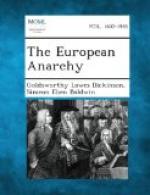The pacific settlement of the conflict of 1911 gave a violent impulse to the war party in Germany, to the propaganda of the League of Defence and the Navy League, and a greater force to their demands. To their dreams of hegemony and domination the desire for revenge against France now mingled its bitterness. A diplomatic success secured in an underground struggle signified nothing. War, war in the open, that alone, in the eyes of this rancorous tribe, could settle definitely the Moroccan question by incorporating Morocco and all French Africa in the colonial empire they hoped to create on the shores of the Mediterranean and in the heart of the Black Continent.[5]
This we may take to be a correct description of the attitude of the Pangermans. But there is no evidence that it was that of the nation. We have seen also that Baron Beyens’ impression of the attitude of the German people, even after the Moroccan affair, was of a general desire for peace.[6] The crisis had been severe, but it had been tided over, and the Governments seem to have made renewed efforts to come into friendly relations. In this connection the following dispatch of Baron Beyens (June 1912) is worth quoting:—
After the death of Edward VII, the Kaiser, as well as the Crown Prince, when they returned from England, where they had been courteously received, were persuaded that the coldness in the relations of the preceding years was going to yield to a cordial intimacy between the two Courts and that the causes of the misunderstanding between the two peoples would vanish with the past. His disillusionment, therefore, was cruel when he saw the Cabinet of London range itself last year on the side of France. But the Kaiser is obstinate, and has not abandoned the hope of reconquering the confidence of the English.[7]
This dispatch is so far borne out by the facts that in the year succeeding the Moroccan crisis a serious attempt was made to improve Anglo-German relations, and there is no reason to doubt that on both sides there was a genuine desire for an understanding. How that understanding failed has already been indicated.[8] But even that failure did not ruin the relations between the two Powers. In the Balkan crisis, as we have seen and as is admitted on both sides, England and Germany worked together for peace. And the fact that a European conflagration was then avoided, in spite of the tension between Russia and Austria, is a strong proof that the efforts of Sir Edward Grey were sincerely and effectively seconded by Germany.[9]
[Footnote 1: See “Morocco in Diplomacy,” Chap. XVI. A dispatch written by M. Leghait, the Belgian minister in Paris, on May 7, 1905, shows that rumour was busy on the subject. The secret clauses of the Franco-Spanish treaty were known to him, and these provided for an eventual partition of Morocco between France and Spain. He doubted whether there were secret clauses in the Anglo-French treaty—“but it is supposed that there is a certain tacit understanding by which England would leave France sufficient liberty of action in Morocco under the reserve of the secret clauses of the Franco-Spanish arrangement, clauses if not imposed yet at least strongly supported by the London Cabinet.”




